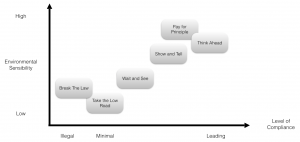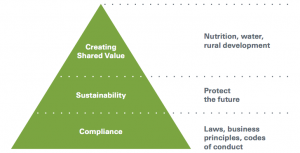Last week I was privileged to be invited to a session of continuous learning from our Alumni Association hosted by Antonio Argandoña, Professor Emeritus in Ethics and Economy. Also invited was Laurent Dereux, General Manager of Nestlé here in Spain.
Professor Argandoña started the session off with a reference to the Pope’s encyclical on the environment, Laudato Si, which was published almost one year ago and explained to some degree on this site at the time. As his expertise is in Corporate Social Responsibility, Argandoña, stressed the social aspects of Laudato Si in addition to the Church’s commitment to the natural environment.
Strategic Options
I spent my allocated 20 minutes going through some of the themes of Strategy & Sustainability, a book I published last fall with the objective of giving Sr. Executives and company Directors a way of connecting with the strategic issues involved using the language and mindset of business as opposed to that of ecologists. In my view there are five strategic issues at play and firms have a choice on whether to focus on complying with the law or going “beyond compliance” as discussed by Harvard’s Forest Reinhard.
 Each company or institution also has, I believe, its own degree of “environmental sensibility” and by that I mean the degree to which its shareholders, customers, employees, neighbors or civil society as a whole are concerned with its environmental performance. While Pope Francis urges “all people of good will” to do what they can, the government does regulate some industries more than others. Putting these ideas together gives a map of different options that a firm can choose and the basic idea I tried to get across to the alums was that the choice of overall strategy must be made by the CEO and the Board from the different choices are shown graphically.
Each company or institution also has, I believe, its own degree of “environmental sensibility” and by that I mean the degree to which its shareholders, customers, employees, neighbors or civil society as a whole are concerned with its environmental performance. While Pope Francis urges “all people of good will” to do what they can, the government does regulate some industries more than others. Putting these ideas together gives a map of different options that a firm can choose and the basic idea I tried to get across to the alums was that the choice of overall strategy must be made by the CEO and the Board from the different choices are shown graphically.
Clearly no company should adopt a strategy which explicitly or implicitly condones Breaking The Law although we have had the recent example of Volkswagen which has been discussed in an earlier post.
I do believe that complying with the law in every country and territory in which a firm does business is certainly legitimate and can be quite complex when dealing with a large multi-product multinational such as Nestlé. To go beyond that and adopt, what I call, Wait and See, is about pro-actively looking at issues such as consumer behavior and trying to predict if and when they will start to pay for higher levels of environmental performance or simply demand it as a condition to remain loyal to a particular brand.
Show and Tell is about building a company’s legitimate efforts to improve its performance into its communications program and differs from greenwashing when such actions are genuine and based on wide spread commitment. The last two options go well beyond compliance and are typically driven by the convictions of shareholders, who agree to spend part of their potential profits in this way, or savvy managers who are convinced that investments in improved environmental performance today will pay off tomorrow due to changing consumer behavior, regulations or both.
Creating Shared Value at Nestlé
 With over 335,000 employees and 436 factories worldwide, assuring global compliance is a challenging task at Nestlé. Compliance is, in fact, only the first step in the company’s approach as it also has a strong commitment to environmental sustainability and what it calls creating shared value with civil society. Nestle’s tree major initiatives are in the areas of nutrition, water and rural development and Laurent Dereux also discussed the company’s commitment to youth employment in Europe. Nestlé actually has 39 commitments for 2020 and is routinely ranked at or near the top by the different rating agencies and surveys of sustainable companies.
With over 335,000 employees and 436 factories worldwide, assuring global compliance is a challenging task at Nestlé. Compliance is, in fact, only the first step in the company’s approach as it also has a strong commitment to environmental sustainability and what it calls creating shared value with civil society. Nestle’s tree major initiatives are in the areas of nutrition, water and rural development and Laurent Dereux also discussed the company’s commitment to youth employment in Europe. Nestlé actually has 39 commitments for 2020 and is routinely ranked at or near the top by the different rating agencies and surveys of sustainable companies.
What is interesting about Nestlé is that while the company does have outstanding performance in a number of areas associated with the environment and social responsibility, very little of that can be found in their marketing messaging or general communications. As opposed to what I called Show and Tell in the book, Nestlé is actually doing more and saying less than some of its competitors. Dereux felt this was part of the company’s Swiss heritage which is to demonstrate one’s values through actions rather than words. Nestlé’s former head of worldwide operations, Spaniard, José Lopez, once told me that his goal was that the company should never be accused of greenwashing and thus would quietly work to improve society and the environment.


Excellent article. I have been looking at a number of multi national firms and reading the many “green” stories each have. It appears that some have extremely large green budgets but some less said. Nestle is a stand out in terms of little if any green marketing. Perhaps their longevity and deep repetitional reserve holds them in good stead. Another consideration is a well trod investment bank PR strategy of not saying anything and not responding to anything. In other words don’t set yourself up for failure, keep your head down. I am just re-reading Maarten Hajer’s excellent 1995 book “The politics of Environmental Discourse”. Who controls the environmental discourse and why? Silence is a strong strategy.
This is the same Nestlé that wants to privatize water, sell junk food in the Amazon and encourage GM crops, yes?
Ruby slipper’s comment is provocative but at the same time GM crops, junk food and water are all legal and many people want to but them. Should Nestlé not try to do as much as it can given the businesses it is in? a Interestingly enough, bottled water is a great example of something that may or may not be sustainable depending on its sourcing, packaging and the environment in which it is marketed.
Please feel free to add to this conversation!
Mike R